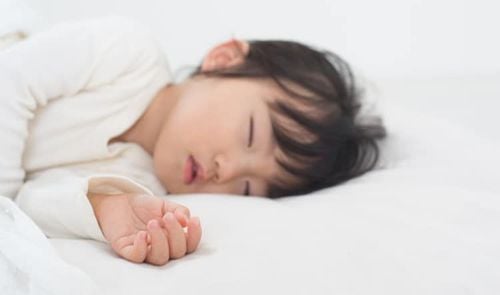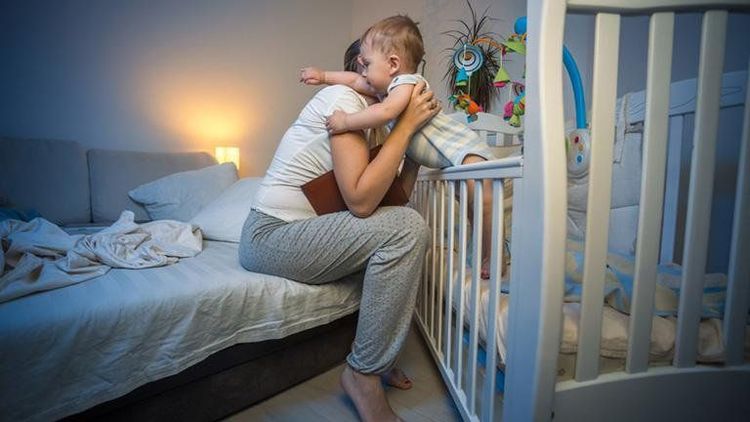This is an automatically translated article.
Children 18 to 24 months old are in a critical learning period. Children may fall asleep due to a desire to learn how to control their surroundings. Therefore, to help children sleep well, let them choose activities before bedtime.
1. Sleep habits of 18 to 24 month old children
How long does a 2-year-old child sleep? Sleep time is about 11 to 14 hours a day, including a nap of 1-3 hours each afternoon. Before age 2, some children still need two naps a day.
2. Establish healthy sleep habits for 18 to 24 months baby
2.1. Help your baby learn to fall asleep on a regular basis At this age, babies can fall asleep on their own without being lulled to sleep. If dependent on external factors, it will be very difficult for the child to fall back to sleep when he wakes up.
If you fall asleep on a pillow, wake up in the middle of the night and find the pillow is gone. You will worry and search for the pillow. This prevents you from going back to sleep.
Similarly, if the child falls asleep every night while listening to a CD. When they wake up in the middle of the night, they wonder where the music is and what will happen when they wake up in the middle of the night. This prevents the child from going back to sleep.

Giúp trẻ học cách tự đi vào giấc ngủ theo thời gian biểu mà không cần ru
To avoid this, try to put your child to bed when drowsy but awake so he can fall asleep on his own. If you haven't focused on sleep training yet, start now, before your baby moves into his or her own bed.
When your baby is 1 year old, you can put a doll, blanket or soft toy on the baby's bed to sleep with. This can help your baby fall asleep more easily.
2.2. Make acceptable choices at bedtime. At this age, children begin to learn independence and control over their environment. To limit your child's desire to have fun when it's time to go to bed, let them choose bedtime activities such as stories they want to hear, pajamas they want to wear, and favorite stuffed animals.
The trick is to only come up with two or three alternatives and make sure you're happy with each one. For example, don't ask, "Does he want to go to bed now?". The child replied no, that is not acceptable.
3. Children 18 - 24 months old do not want to go to sleep, why?
The most common sleep problems for toddlers are trouble falling asleep, separation anxiety, and frequent nighttime awakenings. Children may also have nightmares at night.
Trẻ 18 - 24 tháng tuổi bắt đầu khó ngủ và có thể gặp ác mộng về đêm
Between 18 and 24 months of age, some babies begin to climb out of the crib, then fall out. However, just because a baby is out of the crib doesn't mean he's ready to sleep in bed. Try to keep your baby safe in the crib with these tips:
Lower the mattress : If you move the crib mattress to its lowest position, you can prevent your baby from getting out. (This won't work as the baby gets older) Clean out the crib : To be on the safe side, it's a good idea to remove toys and cushions from the crib. Otherwise, the baby is in danger from actions such as using toys in the crib to get out. If these items are removed, the baby will not be able to get out of the crib. Don't react with undue concern when your baby jumps out: If your baby jumps out of the crib and you react with attention or let him co-sleep, he'll keep doing it. Instead, stay calm and neutral, firmly tell your baby not to climb out, and put him back in the crib right away. Children will quickly understand the meaning. Follow up: Stand in a position where you can see your baby in the crib but he can't see you. If the child tries to get out, immediately tell the child to stay in the same position. Calmly minimize the interaction, so that the child does not turn it into a game. After you do this a few times, your child will learn to stay in place. Establish a safe environment: If you can't keep your child from jumping out, you can at least make sure he or she is safe. Place pillows and other padding on the floor around your baby's crib and on toy cabinets, dressers, and other objects.

Cha mẹ nên chú ý tránh để bé thức dậy và trèo ra khỏi cũi
If the child does not stop climbing, you can move the child to your bed. Because at least you won't have to worry about your child falling and getting hurt.
Establishing healthy sleep habits for children is very important, because sleep ensures the all-round development of children. Parents can apply some of the measures in the above article to form the biological clock and ensure the safety of the child during sleep.
For children to be healthy and develop well, it is necessary to have a nutritious diet in terms of quantity and quality balance. If children are not provided with adequate and balanced nutrients, it will lead to diseases of excess or lack of nutrients, which adversely affect the comprehensive development of children in terms of physical, mental and motor skills.
Parents should supplement their children with supportive products containing lysine, essential micro-minerals and vitamins such as zinc, chromium, selenium, and B vitamins to help fully meet their child's nutritional needs. At the same time, these essential vitamins also support digestion, enhance nutrient absorption, help improve anorexia, and help children eat well.
Parents can learn more:
Signs of zinc deficiency in children
Micronutrient deficiency and failure to gain weight in children
Please regularly visit Vinmec.com website and update useful information to take care of your child. Take care of the baby and the whole family.
Reference source: babycenter.com













